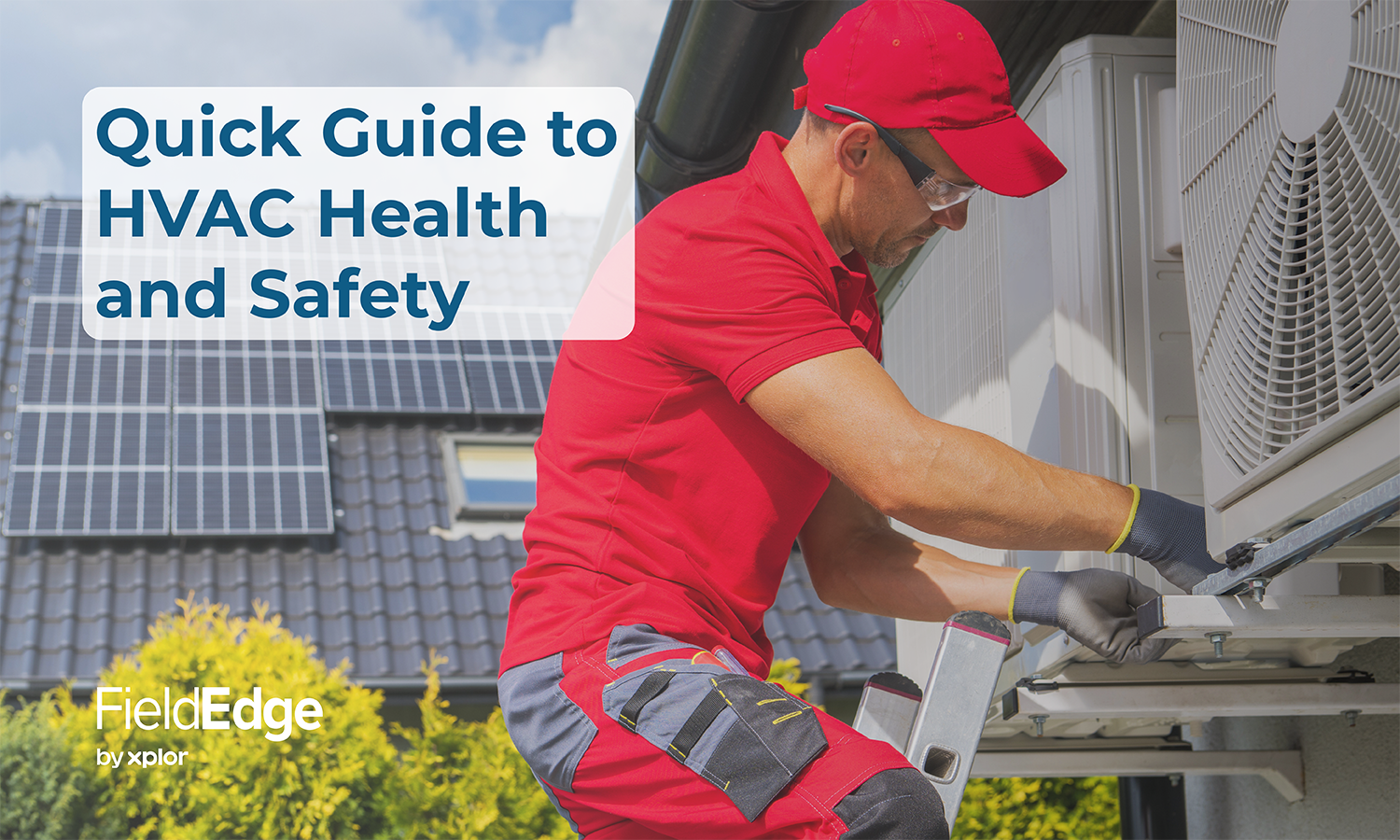HVAC health and safety plays a critical role in keeping technicians safe and happy in your business for the long-term.
Due to the higher risk nature of the HVAC industry, technicians may be exposed to a range of health and safety hazards during their work.
For these reasons, it’s crucial to ensure your business is prioritizing HVAC health and safety standards to:
- Minimize liability
- Prevent burnout
- Comply with legal standards
Use this quick guide to HVAC health and safety to give your business a rapid jumpstart on implementing the right standards!
Provide Adequate PPE
PPE (i.e. personal protective equipment) is a huge part of HVAC health and safety.
All HVAC technicians should wear appropriate PPE to remain protected against exposure to hazardous substances (e.g. chemicals and particulate matter).
Typical HVAC PPE may include items such as:
- Coveralls
- Hard hat
- Ear plugs
- Footwear
- Safety goggles
- Masks and/or respirators
- Non-conductive gloves
As always, check your local laws and follow basic OSHA guidelines to ensure adequate PPE is provided to your technicians. Remember, certain services, such as refrigeration, require very specific PPE needs.
Encourage Proper Lifting Techniques
Since HVAC technicians are required to lift heavy equipment or tools, proper lifting techniques should be used to prevent strains and injuries. Here are a few basic examples of proper lifting techniques:
- Bending at the knees
- Keeping a straight back
- Using a lifting device when necessary
Follow Proper Ladder Safety Protocols
Did you know more than 500,000 people are treated for ladder-related injuries every year? In addition, an estimated 300 people die every year from these injuries.
Since ladder injuries are prevalent in the HVAC industry due to the roof work involved, it’s important to follow safe ladder protocol.
For example, you should ensure all techs are:
- Wearing safety shoes
- Maintaining 3 points of contact on the ladder at all times
- Carrying all necessary tools in a backpack so hands remain free
Adhere to Electrical Safety Guidelines
HVAC technicians may be exposed to electrical hazards during their work. Which means, electrical equipment should be properly grounded and de-energized before work is performed. Plus, all electrical work should be performed by licensed professionals.
Ensure technicians have the equipment on hand to test loose wires. Also, shutting off the power while installing or troubleshooting may be an option.
Ensure Adequate Tool Safety
In order to follow adequate tool safety, you’ll first need to ensure all tools and equipment you’re providing to techs are maintained in good, working condition.
Any damaged or defective tools should be repaired or replaced immediately.
For example, you can provide your techs with company tools cards to make sure they always have the necessary tools on hand for every job.
Educate Your Team on Heat Stress Symptoms
HVAC technicians may be exposed to heat stress during their work, especially during the summer months. For these reasons, adequate hydration and rest breaks should be provided. In addition, work should be scheduled during cooler times of the day when possible.
Heat-related illnesses, such as heat stroke, heat exhaustion and heat cramps, can be dangerous and even life-threatening. Educate your employees on the signs and symptoms of these illnesses, so they can recognize them.
Make sure your employees know what to do if anyone on the team is experiencing symptoms of a heat-related illness.
Keep in mind, 50-70% of work related outdoor fatalities occur in the first few days of working in hot environments due to heat acclimation.
Practice Vehicle Safety
Since HVAC technicians spend a significant amount of time driving between job sites, safe driving practices should be followed.
Take a quick look at a few basic vehicle safety protocols your techs should be following:
- Obeying traffic laws
- Wearing seat belts
- Avoiding distracted driving
Train Techs on Emergency Preparedness
HVAC technicians should be trained in fundamental emergency procedures, such as:
- Company procedures for inclement weather
- How to use emergency equipment (e.g. first aid kits)
- What to do in the event of a fire or medical emergency
Focus on Ergonomics
Many times, HVAC technicians have to work in awkward positions or tight spaces, which can increase the risk of injury.
For this reason, proper ergonomics should be followed:
- Using a stool or ladder when necessary
- Avoiding prolonged periods of awkward postures
- Making use of tools and equipment to ease physical strain whenever possible
Provide Routine Communication and Training
Provide regular training on HVAC health and safety procedures and hazards. In addition, it’s important to encourage open communication between technicians and management about potential health and safety concerns.
Avoid Fatigue and Burnout
Due to the fact that so many technicians are logging 60 plus hours a week, exhaustion and burnout is common in this demanding trade. In turn, this is when costly mistakes are made.
From falling asleep at the wheel to making mistakes with the equipment, fatigue from being overworked can become a real problem.
Make sure there is enough time scheduled between jobs for safe driving. Limit the number of hours working in peak busy times. Plus, make sure technicians are getting enough sleep.
Want to further help out your employees? Book a fieldedge demo to see how the best software can streamline your daily processes and save you time and money!
Prioritize HVAC Health and Safety
Technicians may be exposed to a range of HVAC health and safety hazards during their work. However, by following these guidelines, they can reduce the risk of injury and illness.
You should prioritize the HVAC health and safety of your technicians. In addition, you should provide adequate training and resources to ensure a safe work environment.
Here are a few key takeaways:
- Taking the right precautions is critical to keeping HVAC employees safe
- Proper PPE and hazard training is essential to minimizing liability and protecting your team
Use these expert tips to prioritize HVAC health and safety in your business so you can secure the future success of your business by mitigating liability today!




